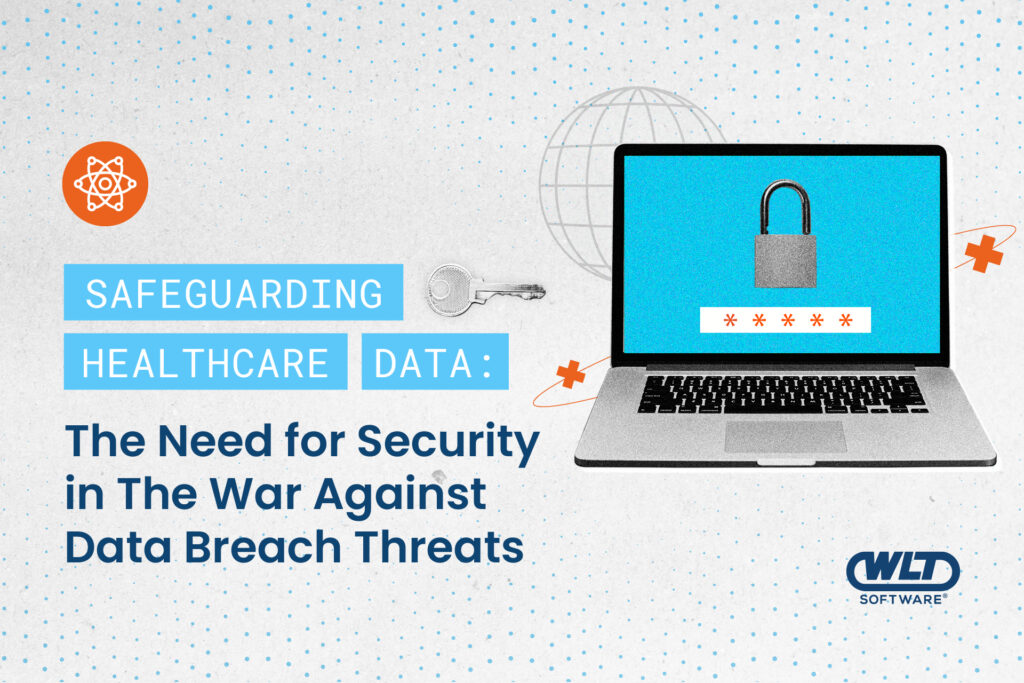The ConnXion Volume 02, Issue 3
In today’s digital age, where data is a valuable currency, healthcare companies stand out as prime targets for cyberattacks. Among these, data-rich healthcare companies are particularly attractive to hackers due to the wealth of sensitive information they possess. As a leading medical claims and benefits administration software provider, WLT Software understands the critical importance of safeguarding healthcare data and the crucial role a robust security software platform has in defending against data breach threats.
Why is Healthcare Data Targeted by Cybercriminals?
Healthcare data is a treasure trove for cybercriminals. It encompasses a vast array of sensitive information, including personal and medical details of patients, insurance records, financial data, and more. This wealth of data makes healthcare organizations highly lucrative targets for hackers seeking to exploit vulnerabilities in their systems. The consequences of a data breach in the healthcare sector can be catastrophic, leading to compromised patient confidentiality, financial losses, legal liabilities, and damage to reputation.
At WLT Software, we recognize that the security landscape is constantly evolving, with hackers employing increasingly sophisticated tactics to infiltrate systems and steal data. As such, relying on basic security measures is no longer sufficient to protect sensitive healthcare information. A comprehensive security software platform is essential to fortify defenses and thwart cyber threats effectively.
Here are some key reasons why data-rich healthcare companies are prime targets for hackers:
- Valuable Data Assets: Healthcare companies possess a goldmine of valuable data, including patient records, medical histories, insurance information, and billing details. This data is highly sought after by cybercriminals for various malicious purposes, such as identity theft, financial fraud, and extortion.
- Lax Security Practices: Despite advancements in cybersecurity, many healthcare organizations still have lax security practices, such as outdated software, weak passwords, and inadequate encryption measures. These vulnerabilities provide entry points for hackers to exploit and gain unauthorized access to sensitive data.
- Financial Incentives: Data breaches in the healthcare sector can be highly profitable for hackers. Stolen medical records fetch a high price on the dark web, attracting cybercriminals who are motivated by financial gain. Additionally, ransomware attacks targeting healthcare organizations demand hefty ransom payments, further incentivizing hackers to target this industry.
- Regulatory Non-Compliance: Healthcare companies are subject to stringent regulatory requirements, such as HIPAA (Health Insurance Portability and Accountability Act) in the United States. Non-compliance with these regulations not only exposes organizations to legal penalties but also increases the risk of data breaches if proper security measures are not implemented.
- Interconnected Systems: The interconnected nature of healthcare systems, including electronic health records (EHRs), medical devices, and third-party service providers, creates a complex network that hackers can exploit. A breach in one system can potentially compromise the entire ecosystem, leading to widespread data exposure.
Given these challenges, WLT Software emphasizes the critical importance of investing in robust security software platforms that are tailored to the unique needs of healthcare organizations, such as MediClaims – our flagship benefits and claims management system – and MediConnX – our robust benefits administration portal. Our comprehensive approach to security includes:
- Advanced Encryption and Secure Desktop Gateways: Utilizing robust encryption algorithms and secure desktop gateways to protect data both in transit and at rest, ensuring that sensitive information remains secure, including RDP credentials, VPN parameters, and network security monitoring.
- Secure Data Storage and Testing: Storing data in Oracle tables, encrypted in Oracle’s Cloud, with nightly backups moved offsite to a secure location. When quarterly system updates are released, systems are tested in multiple environments with different database versions, different operating systems, and different updates to identify present and potential conflicts.
- Regular Security Audits: Conducting regular security audits and vulnerability assessments, including SOC 2 examination, to identify and address potential weaknesses in systems and applications proactively.
- Risk Management: Outlining formal risk management practices to gain an accurate and thorough understanding of the potential risks to and vulnerabilities of the confidentiality, integrity, availability, and safety of information and information systems.
- Incident Response Plan: Developing and implementing a robust incident response plan to quickly detect, mitigate, and recover from security breaches, minimizing the impact on operations and data integrity.
By prioritizing security and adopting a proactive approach to cybersecurity, healthcare organizations can mitigate the risks associated with data breaches and safeguard the confidentiality, integrity, and availability of sensitive information.
In conclusion, data-rich healthcare companies are highly attractive targets for hackers due to the valuable nature of their data, lax security practices, financial incentives, and interconnected systems. As a trusted medical claims adjudication and benefits administration software provider, WLT Software underscores the vital importance of implementing a robust security software platform to defend against data breach threats effectively. By investing in advanced security measures, healthcare organizations can uphold patient trust, protect sensitive data, and mitigate the devastating impacts of cyberattacks in the ever-evolving digital landscape.
To learn more about how WLT Software can help secure your healthcare, request a demo today.
